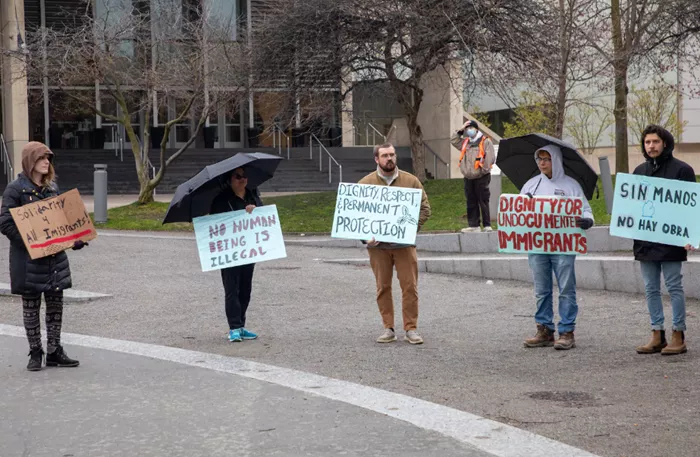As the November elections approach, immigration disinformation remains a significant concern. In the past week, several conservative figures have misrepresented data regarding immigrants with criminal convictions. They have falsely claimed that the Biden administration has allowed thousands of violent criminals to enter the United States.
In reality, many immigrants convicted of violent crimes have lived in the U.S. long before Biden took office.
Perhaps more damaging than these misleading statements are the increasing number of anti-immigrant laws proposed in recent years. The League of United Latin American Citizens (LULAC), the oldest and largest Hispanic civil rights organization in the U.S., reported that there were 561 proposed anti-immigrant bills from 2020 to 2024. This marks a staggering 357% increase in such proposals in state legislatures since 2020.
Among the latest controversial measures are Texas’ SB 4 and Florida’s SB 1718. These laws give state and local authorities the power to enforce federal immigration laws and make it a crime to transport undocumented immigrants into Florida.
Proponents of these laws often argue that they prioritize the interests of “real Americans” over those of immigrants. They cite national security, the U.S. economy, and “cultural preservation” as key reasons for their anti-immigration stance, according to LULAC.
However, only about 13% of these proposals—74 bills—were passed by state legislatures between 2020 and 2024. LULAC also found that anti-immigrant legislation had an average success rate of 12.5% each year, compared to 27% for all other types of proposals.
Andrew Hendrickson, the government relations coordinator at the ACLU of Texas, noted that anti-immigrant proposals can have significant impacts, even if they do not pass.
“It would be misleading to say these proposals do not affect people just because they are not fully enacted,” Hendrickson explained.
LULAC highlighted that many of these anti-immigrant laws are largely symbolic and politically motivated, aiming to rally support among voters and lawmakers.
For instance, Arizona’s HCM 2007, which passed both houses of the state legislature in 2023, accused President Joe Biden’s administration of failing to enforce federal immigration laws. The bill claims this inaction has led to a “historic invasion” of illegal immigrants crossing the southern border.
This Arizona bill also urges Congress to pass HR 9174, the State Immigration Enforcement Act, which would empower state and local governments to enforce federal immigration laws.
LULAC found that more than 97% of the anti-immigrant legislation proposed from 2020 to 2024 was sponsored exclusively by Republicans. Only 14 bills, or 2.5%, received bipartisan support.
“Some of these proposals are merely statements by politicians who believe that exploiting hate will enhance their political careers,” Tanya Broder, senior counsel at the National Immigration Law Center (NILC), stated. NILC advocates for the rights of low-income immigrants in the U.S.
Broder emphasized that the negative consequences of anti-immigrant laws affect everyone, not just migrant communities.
“Efforts to target undocumented immigrants also impact citizens and immigrants of all statuses, as it’s impossible to separate undocumented immigrants from those living with them in families and communities,” Broder noted.
Sarah Cruz, a policy and advocacy strategist for the ACLU of Texas, found that anti-immigrant bills—regardless of their passage—often marginalize the over 11 million undocumented immigrants in the U.S., making communities less welcoming.
“These proposals exemplify how harmful rhetoric can evolve into laws and policies that push immigrant communities into the shadows,” Cruz explained.
Analyses of laws like Florida’s SB 1718 and Texas’ GA-46, which requires public hospitals to collect patients’ immigration status, reveal that such strong anti-immigrant measures discourage undocumented individuals from seeking jobs or healthcare, fearing they might attract law enforcement.
“These proposals create fear and distrust within the community,” Hendrickson said.
Hendrickson added that many of the anti-immigrant measures are not only cruel but also expensive and unsustainable. For example, Texas has invested over $11 billion in Operation Lone Star in the past three years. This initiative has led some Republican officials in Texas to question its long-term effectiveness.
Despite the costs and conflicts between state and federal authorities related to this operation, Texas officials have received consistent support from Republican politicians. They point to Operation Lone Star as a contributing factor in a reported 74% decrease in illegal border crossings since it began in 2021.
“One of the real tragedies is that these measures are not long-term solutions to anyone’s problems,” Hendrickson said. “They are not enforceable and still cause significant harm while costing taxpayers a great deal.”
Organizations like NILC and the ACLU of Texas fight against regressive anti-immigrant legislation through advocacy and litigation. For example, the ACLU has sued Texas over SB 4, arguing that it is unconstitutional and conflicts with federal law. Advocates believe these efforts help keep the negative effects of such proposals in the public eye.
“We continue to inform our community members about the laws and their implications,” Cruz stated. “We are sharing our knowledge about rights so that individuals can have some protection when interacting with law enforcement.”
Broder emphasized that immigrants, regardless of their documentation status, have allies in the community who recognize the dangers of targeting specific populations.
“Historically, immigrants have collaborated with healthcare providers, businesses, educators, and others who appreciate the contributions of immigrants, regardless of their status,” Broder said.
Related topics:
- New Tourist Visa Expands Access for Americans to This Previously Closed Country
- Senators Propose Visa Integrity Preservation Act to Close U.S. Immigration Policy Loopholes
- Sri Lanka to Exempt 35 Countries from Visa Requirements Starting October 1, 2024


